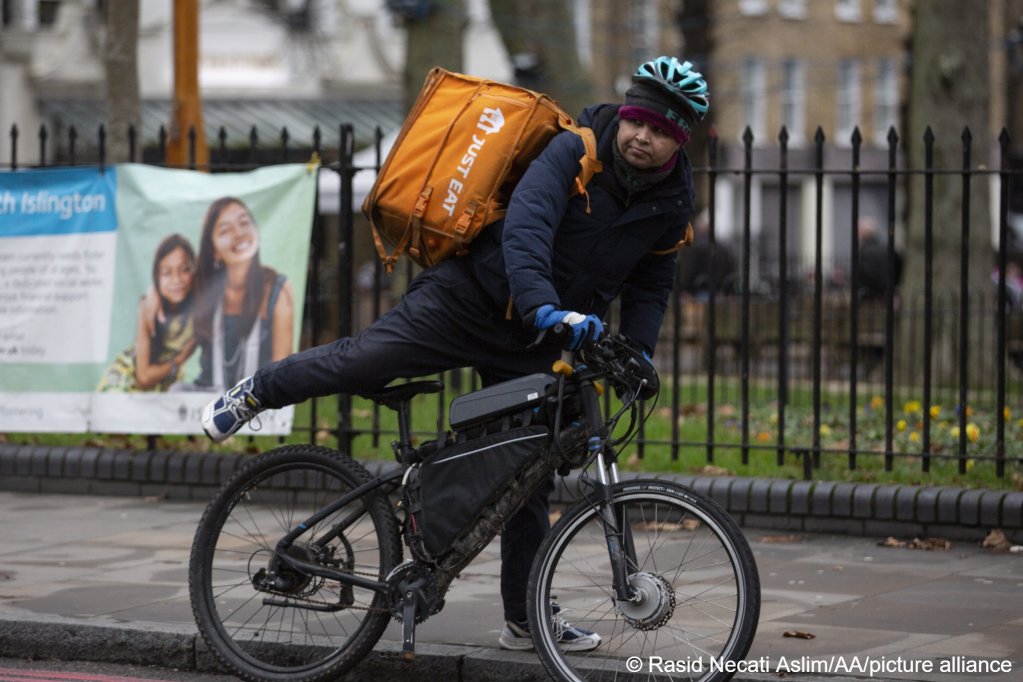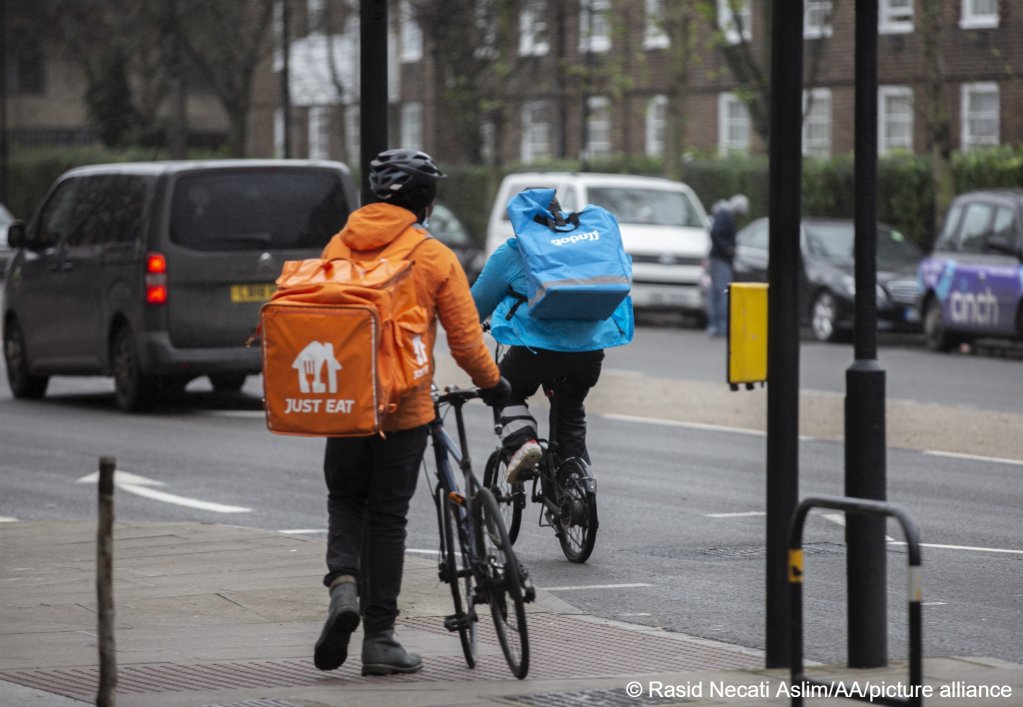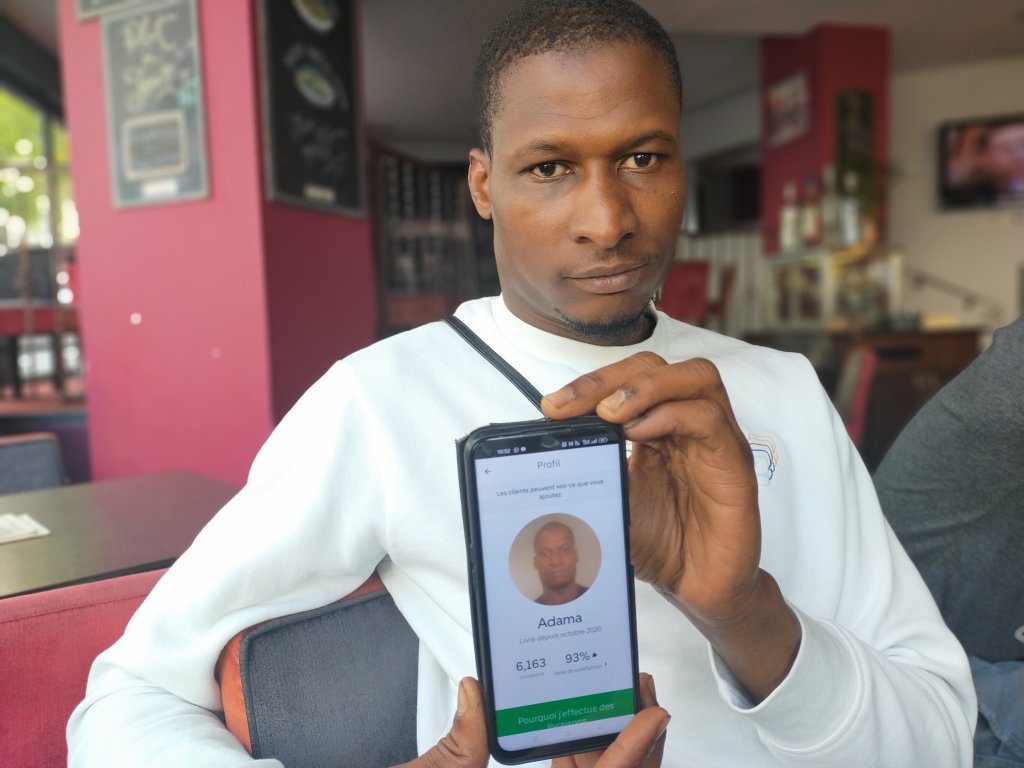The British government has scheduled meetings with food delivery firms next week, in a further attempt to tighten up migration policy. Reports suggest that already accredited drivers could be subletting their accounts to newly arrived migrants, who do not yet have the permission to work.
The British government is set to meet food delivery companies next week after reports revealed once again that accredited drivers could be "sub-letting" their accounts with firms like Deliveroo and Just Eat to migrants and asylum seekers who do not yet have the authority to work.
This sub-letting agreement, which reportedly goes for as low as 40 British pounds (roughly 47 euros) a week, enabled some asylum seekers to work as food couriers "within hours" of arriving in the United Kingdom (UK), claimed the right-wing and anti-migrant news channel GB News, as well as several other British newspapers.
People applying for international protection status are not allowed to work for the first 12 months of being in the UK or until their asylum application is approved. If caught working without papers, both employee and employer are liable to prosecution and fines, and for an employer, up to five years in prison. Employees could face being removed from the UK, if convicted of breaking the law, and could also be issued with a re-entry ban.
Illegal working can attract fines, prison sentences and ban from the UK
Fines against illegal working tripled in 2024 under legislation introduced by the previous Conservative government. In that guidance, the British government writes that "all employers have a responsibility to avoid illegal working, by carrying out "simple right-to-work checks."
According to reports from the BBC and The Sun, the sub-letting arrangement was discovered in dozens of online forums where legal riders were offering to "lease" their accounts.
The news report promoted the Conservative shadow Home Secretary Chris Philip (part of the opposition) to visit an asylum hotel in London, where he claimed to have seen evidence of people working unauthorized for various food delivery apps.
When the Conservative party was in power they also launched a crackdown of this kind of illegal work and also held meetings with the food delivery firms. In April 2024, the Home Office at the time published a notice where they wrote: "Following an increase in immigration offences by gig workers in the region, Home Office teams have stepped up action to tackle illegal working and this week arrested drivers working for companies including Deliveroo, JustEat and UberEats."
The press release went on to detail that some of the arrests "were for offences including illegal working and possession of false documentation," and "the operation also led to the seizure of weapons and cash suspected of being linked to criminal activity."
Read AlsoAfrican Uber Eats riders protest in Paris over 'fraud' dismissals
New legislation
In March, the government announced a new directive requiring companies hiring people in the gig economy will now be legally required to carry out checks confirming that anyone working in their name is eligible to work in the UK, bringing them in line with other employers.
The Home Office website states that "these vital checks, which take just minutes to complete, confirm someone’s immigration status and allow them to legally work in the UK."

This shift in employment policy means that for the first time, this verification requirement will extend beyond traditional employment sectors to food delivery, construction, beauty services, and courier work. These immigration checks are already standard for conventional employers but have been largely absent in the flexible gig economy, where people are mostly employed as short-term contractors or projects -- known as gigs.
Firms that fail to carry out these checks could face severe penalties—including fines of up to 60,000 pounds (70,000 euros) per unauthorized worker, business closures, director disqualifications, and even prison sentences of up to five years. The move aims to crack down on illegal working, which the government says undermines wages and undercuts law-abiding businesses.
The new measures are part of a broader strategy to reinforce immigration controls and disrupt human smuggling networks.
Read AlsoIn Paris, a place for bicycle couriers to rest between deliveries
'Rogue employers'
Meanwhile, workers' rights groups strongly criticized the government’s new right-to-work legislation.
Worker Info Exchange, a campaign group and NGO focused on gig-economy transparency, slammed both the Home Office and food courier companies, saying that the deliberate exploitation of vulnerable workers by platform employers has been a feature of Britain’s gig economy for many years.
"The Home Office demonizes migrant workers in a bid to tackle 'rogue employers' while neglecting a modern slavery victim backlog of 20,000 people," said James Farrar, Director of Worker Info Exchange, in a statement.

Constant fears of losing work and 'subletting'
On the discussion platform, Reddit, one (unverified by InfoMigrants) user shared their experience of working in the gig economy, in this instance for the company Amazon. They reported having a constant fear of being deactivated and losing their job, if they didn't meet performance targets.
The experiences of delivery drivers, many of whom are migrants, is mirrored in cities across Europe. In 2022, InfoMigrants French also spoke to several migrants working as cycle delivery drivers operating in the French capital.
They confirmed that at that time in France it was "common practice" to sublet a registered identity from someone they knew in order to work. One young man, Aboubacar Cissé, told InfoMigrants that although he had a 93 percent approval rating and had completed more than 6,000 deliveries in two years, he had his account "deactivated due to fraudulent documents." He had been using an account under the name of "Adama".
"I was told my profile photo didn't match my ID card. They knew the two photos weren’t identical but they had no problem with it up until now," said Aboubacar, his voice hoarse from chanting during a protest earlier that week against the company’s decision. Like Aboubacar, around 2,500 delivery workers who use "borrowed" IDs to open their accounts had their accounts shut down overnight in 2022.
Using false identities is a common practice among undocumented migrants. These identities, however, are not imagined: they are people in a regularized situation, often "cousins", who "lend" their name and other administrative details to people so that they can work using an alias. In this case, these papers are essential for delivery couriers to create their self-employed status.

Additionally, in April 2023, Worker Info Exchange released a report on one of the delivery companies, known as Just Eat which revealed that 50 workers were allegedly paid by the employer into a single bank account.
According to the NGO, payment arrangements like this into a single bank account are a recognized red flag for creating potential conditions that could lead to situations of modern slavery.
"These [types of companies] are the real 'rogue employers' who have dodged employment and tax obligations for years," claimed Farrar. WIE has successfully litigated in the UK against several employers operating in the gig economy on various grounds, states the WIE website.
Read Also'I feel lost and depressed': Undocumented delivery workers for Uber Eats
Gig economy
The UK’s gig economy has drawn in a workforce that in 2024 was estimated at 1.7 million people. A report about the UK Gig Economy Statistics released in April stated that from ride-hailing drivers to freelance designers, one in six adults in the UK takes on gig work at least once a week. While this sector contributes 20 billion British pounds (about 23.5 billion euros) annually—matching the value of the UK’s aerospace industry—many workers are facing significant challenges.
Nearly half, or about 48 percent of gig workers also hold full-time jobs, with 71.5 percent saying gig work makes up less than half of their income. For 20 percent, however, it is their primary livelihood, especially among couriers and private hire drivers, 36 percent of whom rely on it as their main source of income.
Despite their contribution, around 52 percent of gig workers earn below the legal minimum wage, averaging just £8.97 per hour (around ten euros). Gender inequality persists too, with women earning 10 percent less than their male counterparts.
Financial hardship and the need to cover economic shortfalls are key drivers for those working in the gig economy. Almost 90 percent of gig workers in the UK said the cost of living crisis pushed them to take up extra work. Migrants in cities across Europe can be seen working jobs in the gig economy.
With additional reporting from Charlotte Oberti from 2022 for InfoMigrants French
